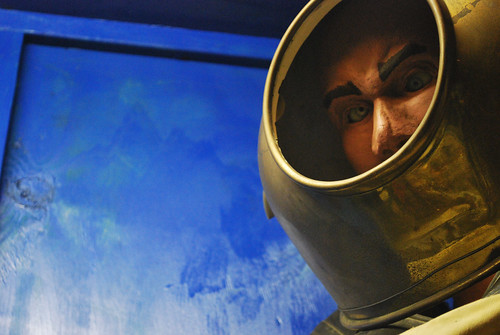
{Photos by rocketlass.}
From Moby-Dick, by Herman Melville
What is the great globe itself but a Loose-Fish? And what are you, reader, but a Loose-Fish and a Fast-Fish, too?A press of obligations has me feeling much more like a fast-fish than a loose-fish today, but I feel I should at least take the time to point you to my guest post on the blog of the recently launched online book site the Second Pass. Follow that link and you'll find me raving about an old favorite, Moby-Dick, and a new favorite, Dan Beachy-Quick's A Whaler's Dictionary; dig around the site some more and you'll find plenty of good stuff (including an excellent appreciation of Russell Hoban's doomsday novel, Riddley Walker).
But first, back to Melville. I hope that if I've established anything with this blog, it's the fact that one book always leads to another: my love of Moby-Dick led me to pick up A Whaler's Dictionary when I spotted it in St. Mark's back in January; reading it led me both back to Moby-Dick and, thanks to a recommendation from reader ctorre, forward to Paul Metcalf's unclassifiable novelish book Genoa: A Telling of Wonders (1965), which takes much of its material and inspiration from Melville.

You enter one book, but you may find that the only exit from that book opens right into another one; as Metcalf writes,
[S]inking in one ocean, I have risen to the surface of another--in a different hemisphere, or on the other side of the equator. The heart beats, the blood flows, the lungs inhale and discharge air--but all are radically altered.I've been dipping into all three volumes here and there for months; the melting away of the lake ice and the halting approach of spring makes me think it's the right time to banish all other books from my shoulder bag and read only the tales of the whale for a while.
So I'll plunge in, and who knows what I might find at the confluence of the three books' waters? Perhaps I'll discover what Beachy-Quick describes in his entry for "Line":
Every book, unlike every whale hunt, ends in silence. The line runs out and becomes blank.

Oh nice - I always feel like not enough people know about Paul Metcalf's work, which falls between the usual categories. Genoa is the best-known one, but it's a little misleading - most everything he wrote after that isn't fictional at all, though Melville turns up fairly often. You might look for Enter Isabel, which is a collaged work of correspondence with Melville scholar Clare Spark? She wrote a book a couple years back called Hunting Captain Ahab which is a study of the politics around how Moby-Dick was read - she makes the intriguing argument that Melville actually meant Ahab to be seen as the hero of the novel.
ReplyDelete(And I presume you know the weirdly lyrical bits of Melville-criticism floating around: Charles Olson's Call Me Ishmael & Jay Leyda's The Melville Log; Metcalf and Beachy-Quick fit in nicely.)
Georges Perec's 'A Void' (the big book without any occurences of the letter 'E') features an (abridged) retelling of 'Moby-Dick', which is quite inventive given that it can't use the words "whale" or "Ishmael".
ReplyDelete